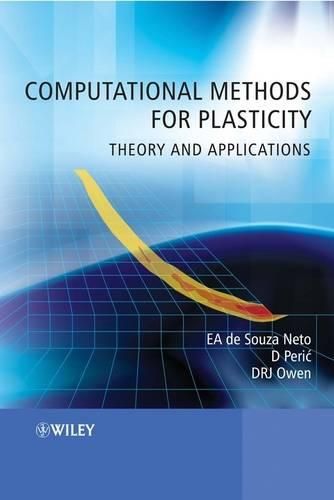Readings Newsletter
Become a Readings Member to make your shopping experience even easier.
Sign in or sign up for free!
You’re not far away from qualifying for FREE standard shipping within Australia
You’ve qualified for FREE standard shipping within Australia
The cart is loading…






The subject of computational plasticity encapsulates the numerical methods used for the finite element simulation of the behaviour of a wide range of engineering materials considered to be plastic - i.e. those that undergo a permanent change of shape in response to an applied force. Computational Methods for Plasticity: Theory and Applications describes the theory of the associated numerical methods for the simulation of a wide range of plastic engineering materials; from the simplest infinitesimal plasticity theory to more complex damage mechanics and finite strain crystal plasticity models. It is split into three parts - basic concepts, small strains and large strains. Beginning with elementary theory and progressing to advanced, complex theory and computer implementation, it is suitable for use at both introductory and advanced levels. The book:* Offers a self-contained text that allows the reader to learn computational plasticity theory and its implementation from one volume.* Includes many numerical examples that illustrate the application of the methodologies described.* Provides introductory material on related disciplines and procedures such as tensor analysis, continuum mechanics and finite elements for non-linear solid mechanics.* Is accompanied by purpose-developed finite element software that illustrates many of the techniques discussed in the text, downloadable from the book’s companion website. This comprehensive text will appeal to postgraduate and graduate students of civil, mechanical, aerospace and materials engineering as well as applied mathematics and courses with computational mechanics components. It will also be of interest to research engineers, scientists and software developers working in the field of computational solid mechanics.
$9.00 standard shipping within Australia
FREE standard shipping within Australia for orders over $100.00
Express & International shipping calculated at checkout
The subject of computational plasticity encapsulates the numerical methods used for the finite element simulation of the behaviour of a wide range of engineering materials considered to be plastic - i.e. those that undergo a permanent change of shape in response to an applied force. Computational Methods for Plasticity: Theory and Applications describes the theory of the associated numerical methods for the simulation of a wide range of plastic engineering materials; from the simplest infinitesimal plasticity theory to more complex damage mechanics and finite strain crystal plasticity models. It is split into three parts - basic concepts, small strains and large strains. Beginning with elementary theory and progressing to advanced, complex theory and computer implementation, it is suitable for use at both introductory and advanced levels. The book:* Offers a self-contained text that allows the reader to learn computational plasticity theory and its implementation from one volume.* Includes many numerical examples that illustrate the application of the methodologies described.* Provides introductory material on related disciplines and procedures such as tensor analysis, continuum mechanics and finite elements for non-linear solid mechanics.* Is accompanied by purpose-developed finite element software that illustrates many of the techniques discussed in the text, downloadable from the book’s companion website. This comprehensive text will appeal to postgraduate and graduate students of civil, mechanical, aerospace and materials engineering as well as applied mathematics and courses with computational mechanics components. It will also be of interest to research engineers, scientists and software developers working in the field of computational solid mechanics.